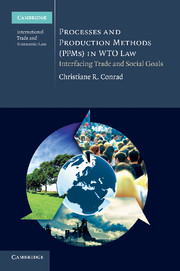Book contents
- Frontmatter
- Contents
- List of figures and tables
- Preface and acknowledgements
- Table of GATT 1947 Reports
- Table of WTO Reports
- List of abbreviations
- Introduction
- I Foundations: the relevance of NPA measures at the interface of domestic regulation, economic globalization and world trade law
- II Legal analysis: reviewing the status of NPA measures de lege lata
- 3 Preliminary considerations: applicability of WTO law and other international law to NPA measures
- 4 Consistency with GATT obligations
- 5 Limits to the justification of NPA measures under the general exceptions
- 6 The status of PPM measures under the TBT Agreement and the SPS Agreement
- III Outlook: new perspectives on the legal status of NPA measures
- Summary and concluding remarks
- Bibliography
- Index
3 - Preliminary considerations: applicability of WTO law and other international law to NPA measures
Published online by Cambridge University Press: 05 June 2011
- Frontmatter
- Contents
- List of figures and tables
- Preface and acknowledgements
- Table of GATT 1947 Reports
- Table of WTO Reports
- List of abbreviations
- Introduction
- I Foundations: the relevance of NPA measures at the interface of domestic regulation, economic globalization and world trade law
- II Legal analysis: reviewing the status of NPA measures de lege lata
- 3 Preliminary considerations: applicability of WTO law and other international law to NPA measures
- 4 Consistency with GATT obligations
- 5 Limits to the justification of NPA measures under the general exceptions
- 6 The status of PPM measures under the TBT Agreement and the SPS Agreement
- III Outlook: new perspectives on the legal status of NPA measures
- Summary and concluding remarks
- Bibliography
- Index
Summary
The perception that NPA measures with restrictive effects on international trade violate GATT obligations is based on the presumption that the respective provisions of the GATT are applicable to NPA measures. This chapter briefly reviews this basic presumption, taking into account that the WTO forms part of the highly fragmented system of international law. While the applicability of WTO law will usually not be under dispute, the applicability of other international law may in some cases be controversial. This situation is particularly relevant to NPA measures.
The national or – in the case of the EC – supra-national, NPA to which a measure is linked inherently relates to a matter other than the tradable good. Depending on its objectives, an NPA measure will usually relate to a subject matter or policy other than trade, for instance, to an aspect of environmental or social policy. Even if the particular aspect at issue is of a strictly national nature, as a corollary of the more and more dense system of international law, the aspect at issue or related aspect may likewise be subject to other public international law, for example, under an international or bilateral treaty. This is particularly true for NPA measures of an environmental nature, but likewise, for example, for national NPA measures touching upon matters of human rights.
- Type
- Chapter
- Information
- Processes and Production Methods (PPMs) in WTO LawInterfacing Trade and Social Goals, pp. 119 - 146Publisher: Cambridge University PressPrint publication year: 2011



